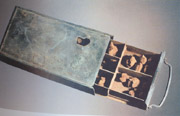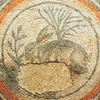
HEALTH AND HYGIENE
Many Romans succeeded in becoming very wealthy, but not always healthy and wise. The majority of them in matters of heath had no better resource than the old saying that a man is either a fool or a physician by the time he is 40; that is to say, everyone has to discover their own weaknesses and how to treat them. Great numbers of Romans, perhaps the majority, never reached the age of 40 because of epidemics and diseases, combined with dirt, flies, and unhygienic food and drink, carried them off at an earlier age. There are stories of Romans living to an advanced age, but the evidence of tomb-stones shows that a great number died young. In the absence of statistics, it is not possible to guess the average expectation of life of a Roman at birth. Today, it is around 30 years of life for the average Indian, but nearer 70 years for the infant New Zealander. We have no reason to believe that the average Roman would have been likely to live much longer than the average Indian child today. The physical conditions of life during the Roman Empire, poor as they would seem by our standards, were nevertheless better than those of the early Republic or of any other large communities in the ancient world. There was a lavish supply of pure water for every inhabitant; far greater than many modern cities can boast.
Most Romans had sufficient clothes and a roof over their heads and many were able to afford some warmth in the short but sharp winter months. The very poor were able to join everyone else at the Baths which were so magnificent a feature of the Imperial City. Physical cleanliness was therefore within the reach of the poorest Roman. Some could not go to the Baths because of ill health, and some because they were slaves chained to their toil. Soap, unknown in the Republic, does not seem to have been used as it is today. Both Martial and Pliny speak of it as an invention of the Gauls for giving a reddish tint to the hair. Pliny recommended it as a remedy against scrofulous sores. He said it was made from tallow (goat's fat) and ashes and was either solid or liquid. It seems to have been expensive. Other cleaning materials, such as sodium carbonate, cost twice as much.
Food, for the average Roman, was probably healthy as well as simple. The rich were just as likely to ruin their health by grossly overeating as the poor were liable to come to harm by short commons or by bad food. The risk of infection from polluted food or water, from flies and mosquitoes and from animals and human beings smitten with diseases, afflicted rich and poor alike. The rich then, as now, were at the mercy of their cooks and their washers-up whose cleanliness could not always be guaranteed.
Apart from infections, there were the usual chances and changes or life, accidents, malformations, indigestion, rheumatism, gout and all the other diseases to which the human flesh is heir.






